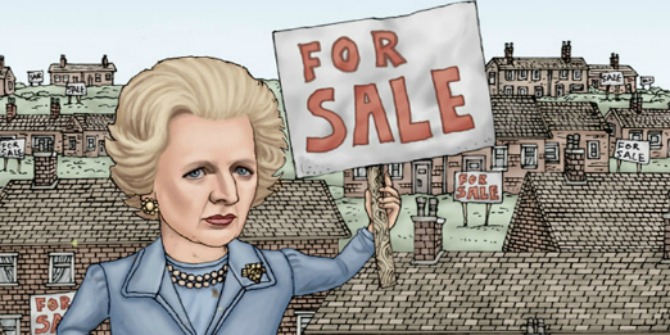One of the ideas behind privatisation was to release the utilities from excessive union control. But amid a cost of living crisis, has the pendulum now swung too far, wonders Sky’s Adam Boulton.
Privatisation is often cited as one of the great achievements of the last extended period of Conservative rule between 1979 and 1997, under Prime ministers Margaret Thatcher and John Major.
More than 50 publicly owned utilities were sold off to the private sector. The idea was that, freed of the dead hand of state bureaucracy, they would be able to raise capital for investment and serve the public better.
The recipe seemed to be working at newly privatised businesses such as British Airways, British Gas and British Steel. Conservative governments pressed on, extending privatisation into some of the most technically tricky areas. The water companies were denationalised in 1989. It was actually John Major, rather than Mrs Thatcher, who oversaw the complicated sell-off of British Rail and most of the domestic energy supply sector.
The Labour governments which followed under Tony Blair and Gordon Brown chose not to reverse the privatisations. The Conservatives have been back in power since 2010 and judging by Liz Truss’s and Rishi Sunak’s leadership campaigns, they still venerate Thatcherism.
But this summer three big privatised utility sectors – water, energy and the railways – are the source of major headaches for the British public and the government, which is still held to account for them in spite of protests that they don’t run them.
Millions of British consumers, farms and businesses are now subject to restrictions on water usage. Meanwhile, water companies are discharging raw sewage into rivers and the sea at record pace, rendering sea bathing a health hazard at many popular holiday beaches.
The rapid rise in gas prices is driving inflation and the cost of living crisis. With two increases in the energy price cap due in the next six months, the average household’s annual energy bill is expected to top £5,000 – an unsustainable level for many.
Rail travellers are being hit by various strikes by the RMT and ASLEF trade unions, with the nominal management unable to engage in serious negotiations because of stipulations laid down by ministers, who simultaneously refuse to become directly involved.
Even as Mr Sunak and Ms Truss talk of tax cuts and supply side reforms, public opinion is considering quite different solutions to Britain’s woes. A new opinion poll by Survation shows strong backing for returning major utilities to the public sector, including from Conservative voters.
They also want to renationalise Royal Mail and bus companies. Support for any of these ideas amongst people who voted Conservative in 2019 is never less than 55%.
Privatisation does not seem to have brought massive investment in infrastructure compared to the dividends, salaries and bonuses taken out by the utilities’ new owners. In the water industry, for example, no major new reservoir has been built in the UK for more than 30 years. The so-called “National Water Grid” is still just a pipe-dream. Over that three-decade period, water companies have spent £123bn on maintenance and infrastructure and have taken out £57bn – almost half as much – in dividends.
Thames Water has imposed hose pipe bans on millions in the South East. Last year it suspended a drought action plan; meanwhile its CEO, Sarah Bentley, reportedly received a £500,000 performance bonus on top of her £750,000 salary.
The utilities are regulated by independent agencies such as Ofwat and Ofgem, but these lack powers and are often seen to be weak and ineffective. This week Christine Farnish, a long-standing member of Ofgem (the Office of Gas and Electricity Markets), resigned because she believes plans to raise the price cap do not reflect “the right balance between the interests of consumers and suppliers”.
If they can’t charge even more, some energy companies are ceasing to trade. The UK taxpayer has already spent £2.7bn bailing out failed energy businesses. According to a proposal from the TUC, this is roughly equivalent to the £2.85bn it would cost to renationalise the sector, although the government would then have to assume all the liabilities.
The railways are already in the process of coming back in part into public ownership. The government has announced a new “Great British Railways” company to take over from Network Rail to run the tracks and infrastructure. Private companies have given up or chosen not to rebid for some rail services, effectively passing them back to state control.
Many countries around the world copied the Thatcherite privatisation idea, though not all to the same extent. Foreign investors have taken advantage of the UK’s free market, however, to buy into British utilities. It is alleged that profit rather than investment is often the motive for some of these funds and businesses.
EDF is a major energy supplier in Great Britain. Electricité de France is 84% owned by the French state. President Macron has kept the energy price rise in France to 4% – far less than the UK hikes. The French water system loses around 5% through leaks, compared to about 25% in England. Five British water companies are foreign-owned.
In spite of public concern, taking utilities back into public ownership is not a political priority – except in Scotland and Wales, where many never left it. At the last election, Jeremy Corbyn advocated widespread re-nationalisation and this is considered to have contributed to Labour’s heavy defeat.
Keir Starmer, the current Labour leader, is cautious. Challenged about privatisation on a recent visit to Swindon, he replied: “We’ll definitely keep rail in public hands. And I accept that the market in water and power is broken, it has been for 10 years.
“I’m not persuaded whether the solution is through nationalisation, or some other reform, or regulation. But yes, something has to change in the market, but I’m a pragmatist, and there’s a discussion whether it needs reform or better regulation.”
Nationalised industries are not fondly remembered. Some remember them as seemingly run for the benefit of their trade unionised workers rather than their customers. Mrs Thatcher’s reforms were credited with reversing the UK’s post Second World War economic decline.
But that was at least a generation ago. The capitalists who now run the UK’s public utilities do not seem to be serving the public very well either. Times change and the public, if not the politicians, would appear to be in favour of a major shake-up in the ownership of vital utilities which serve us all.
Culled from Sky News



